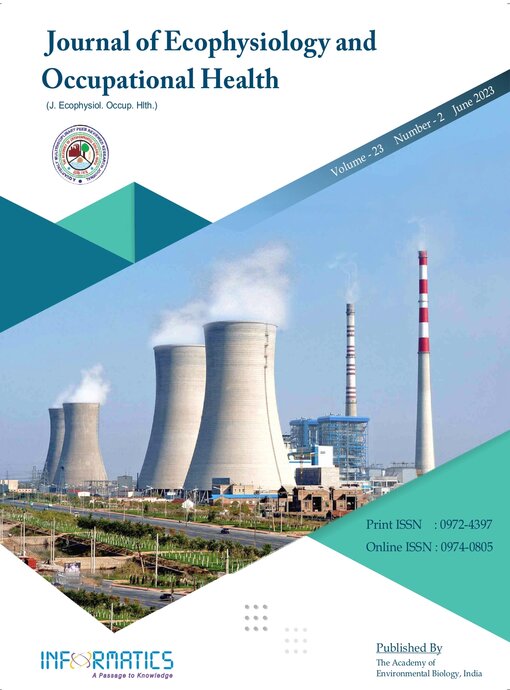Status and Diversity of Ornithofauna in Joggers Park, Lucknow, Uttar Pradesh, India
DOI:
https://doi.org/10.18311/jeoh/2023/31483Keywords:
Diversity, Ornithofauna, Resident Migratory Birds, StatusAbstract
The present study was done to account for the status and diversity of ornithofauna of Joggers Park, Lucknow, U.P., India. The field explorations were carried out from September 2021 to August 2022. During the period of study, a total of 62 species of ornithofauna were identified which belonged to 13 orders and 32 families. The order Passeriformes had a maximum number of bird count (34 species) belonging to 16 families. The least number of bird species was recorded in orders Strigiformes, Charadriiformes, Apodiformes, and Galliformes each containing 1 species. All the 62 avian species reported in Joggers Park come under the least concerned category of IUCN. Out of the total species, 49 species were resident and 13 Residents were Migratory (RM).
Downloads
Metrics
Downloads
Published
How to Cite
Issue
Section
License
Copyright (c) 2023 Anshu Mishra, Prateek, Himanshu Mishra, Vikas Kumar, Ashish Kumar

This work is licensed under a Creative Commons Attribution 4.0 International License.
Accepted 2023-06-26
Published 2023-06-26
References
Ali S. The book of Indian birds. 13th Revised ed. Mumbai: Oxford University Press; 2002. DOI: https://doi.org/10.5962/bhl.title.43949
Grimmett R, Inskipp C, Inskipp T. Birds of the Indian Subcontinent: India, Pakistan, Sri Lanka, Nepal, Bhutan, Bangladesh, and the Maldives. Bloomsbury Publishing; 2016.
Ali S, Ripley SD. Handbook of the birds of India and Pakistan. Mumbai: Oxford University Press and BNHS; 1995.
Amat JA, Green AJ. Waterbirds as bioindicators of environmental conditions. In Conservation monitoring in freshwater habitats. Springer, Dordrecht. 2010; 45-52. https://doi.org/10.1007/978- 1-4020-9278-7_5 DOI: https://doi.org/10.1007/978-1-4020-9278-7_5
Weller MW. Wetland birds: Habitat resources and conservation implications. Cambridge University Press; 1999. https://doi. org/10.1017/CBO9780511541919 DOI: https://doi.org/10.1017/CBO9780511541919
Bilgrami KS. Concept and conservation of biodiversity. Taxonomy and Biodiversity; 1995:1-8.
Gittleman J, Gosling ML, Woodroffe R, Samways M. Conserving bird biodiversity: General principles and their application. Cambridge University Press; 2002.
Rajia S, Alam MM, Chowdhury GW, Akash M, Islam MA. Status and diversity of birds of Ramna Park, Dhaka, Bangladesh. Bangladesh Journal of Zoology. 2015; 43(2):291-301. https://doi. org/10.3329/bjz.v43i2.27399 DOI: https://doi.org/10.3329/bjz.v43i2.27399
De Lima HS, LAS-CASAS FM, Ribeiro JR, Girao WA, Mariz D, Naka LN. Avifauna and biogeographical affinities of a Carrascodominated landscape in north-eastern Brazil: Providing baseline data for future monitoring. Bird Conservation International. 2022; 32(2):275-91. https://doi.org/10.1017/S0959270921000101 DOI: https://doi.org/10.1017/S0959270921000101
Prateek, Mishra A, Mishra H, Kumar V, Kumar A. Status and diversity of butterfly fauna in Joggers Park, Lucknow, Uttar Pradesh, India. Journal of Ecophysiology and Occupational Health 2023; 23(1):43-9. DOI: https://doi.org/10.18311/jeoh/2022/31178
Singh BP, Krishna A, Singh SC, Kumar S. Angiospermic biodiversity of Lucknow areas of Uttar Pradesh, India.
Ali S. The book of Indian birds. 11th ed. Oxford; 1990.
Singh G, Bali P. Dam wildlife sanctuary, Himachal Pradesh, India. Forktail. 29: 141–43.
BirdLife International.Species factsheet. 2022 (cited 2022 October 15). Available from: http://www.birdlife.org.
BirdLife International. IUCN Red List for birds. 2022 (cited 2022 October 15). Available from: http://www.birdlife.org.
 Anshu Mishra
Anshu Mishra








